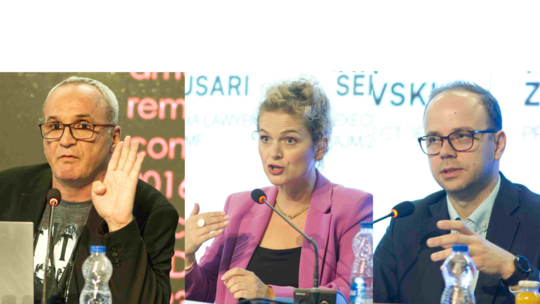“We are very interested, we are working on plans, but the price is too high at the moment”, he told me. I wrote the story up, and it led the Sunday Times business coverage in its following edition.
A few days later, the paper’s lawyer called me. She had received notice of legal proceedings. The subject of my interview claimed that my report had been untrue and damaging. I was summoned to the legal department to hand in my notebook, and decipher my shorthand.
The head of legal and the managing editor probed and probed again. They took voluminous notes. Eventually I was sent away and told that in due course, I should expect to repeat my answers in court.
It was a chastening experience that hung over me for months, and served as my introduction to what are today known by baffling coinage SLAPPS – strategic lawsuits against public participation.
I was reminded of this experience listening to an expert panel on the subject at the European Federation of Journalists' General Meeting in Pristina, Kosovo, 23-24 May 2024.
Hrvoje Zovro, president of the Croatian Journalists’ Association arrived in Kosovo with a keen sense of how the law can be used to stop journalists doing their jobs. The Croatian Supreme Court had ruled days earlier on the legality of his own dismissal as a journalist with Croatian Radiotelevision.
Six years ago, after a 20-year career with the national broadcaster, he stood down from a senior editorial role citing “pressure, censorship and unprofessional choices of topics”. Rather than allow him to return to work as a reporter, however, he was summarily dismissed. His ‘union work’ was cited as grounds. In a six-year legal battle, he won at every stage, save the final ruling earlier in May.
His topic, however, was the general epidemic of legal actions against journalists. He had once received 52 over a period of just six years. During 2023, his Association documented 752 actions against journalists in his country (population 3.8m).
Zovro told the meeting that he thought Croatia the worst country in Europe for Slapps. The culprits are the usual rogues gallery of business interests and politicians, but they are not the worst. “We have nine judges who have sued colleagues in the media”, he said. “Actions of this kind can destroy a journalist, financially”, he told the meeting.
Such is the public outrage at these attempts to muzzle reporters that the CRA has managed to summon a sizeable demonstration in Zagreb against the practice. A repeat is in the planning stages.
Dragan Sekulovski, the executive director of the Association of Journalists in Macedonia, described similar tactics in Skopje, his capital. “We gathered 200 people outside our country’s main courthouse to see us present a certificate to our nation’s biggest censor. It was a good way to raise awareness, and start to build coalitions,” he said.
Sekulovski described the many ways the law can be used to harass journalists – “there can be criminal charges, safety inspections, employment inspections, orders to delete material – all of which the authorities can prolong for years”.
Flutura Kusari from the European Center for Press and Media Freedom explained the rationale for such actions. “Corrupt people have become creative at finding ways to sue journalists. These lawsuits lack foundation. They are launched not with the intention of winning but of initiating cases that drag out for months and years.”
She said that since the murder of Daphne Caruana Galiza in 2017 there had been a change of attitude to Slapps. The Maltese investigative journalist had more than 40 lawsuits open against her at the time of her assassination. This revelation galvanised a group of activists, who since then have successfully brought the issue to public attention and encouraged a few states to legislate to prevent Slapps.
The European Union has issued an anti-Slapp directive, and the Council of Europe promotes policy recommendations. National governments in the UK an Switzerland have taken limited steps to outlaw Slapps. In Greece, unions are working with the government to create laws that will limit potential damages in deformation cases, and allow judges to dismiss Slapps at an early stage.
There have been improvements in Spain too, according to Marta Barcenilla Escaňo, from CCOO. “A new government has led to improvements. We are still barred from criticising the monarchy and there are other laws from the previous government that we are working to reform, but things are getting better.”
Whether the issue of Slapps has grown or shrunk since I was threatened with legal action is hard to say. Beyond doubt, however, are the vigorous campaigns to reign in the practice both internationally and in many nations.
In my own, antique case, the lesson was that the process is the punishment. For at least a year, I fretted about defending my story in court – but that day never came. The writ alone had achieved its twin objectives – wasting my time and warning me off. Eventually, I shrugged off the experience.
Many brave journalists continue in the face of far worse legal harassment, of course, all of whom deserve our support. And wherever campaigns coalesce to combat Slapps more generally, journalists’ unions should be at the head of the charge for change. The law should be an enabler not an embargo, because democracy requires reporting.
Tim Dawson is the Deputy General Secretary of the International Federation of Journalists (IFJ)

